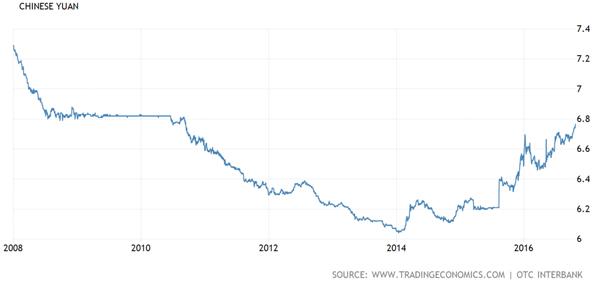I think the Chinese are devaluing the yuan in slow motion but when they realize that the shadow banking system will tighten credit at the worst possible time – just when the PBOC is actively fighting such tighter credit conditions – they are likely to devalue the yuan by a much larger and less orderly amount.
Written by Ivan Martchev
The well-known Chinese curse – “May you live in interesting times” – is playing before our very eyes with the Chinese yuan cents away from the 6.82 mark, where it got “pegged” to help Chinese companies during the Great Financial Crisis in 2008.

The Chinese started a revaluation cycle back in 2005 to appease the U.S. for their trade surplus as well as a massive U.S. dollar reserve accumulation. The U.S. position was that if the Chinese were to let the yuan float and appreciate, the trade balance would correct itself. The Chinese initially revalued the yuan from 8.28 all the way to 6.82, but were forced to stop at that level as they realized in mid-2008 that Wall Street’s problems were likely to result in a much bigger problem for the world economy.
In some respects, the Great Financial Crisis of 2008 contributed to the present problems in the Chinese economy due to the practice of “forced lending” that was deployed as a response. Since the Chinese government controls the banking sector to a large degree, they simply mandated that banks raise their lending quotas as it became clear that demand for China’s exports was falling in late 2008 and early 2009.
Economics 101 teaches that forced lending does not work. It does help economic growth, but it usually results in more losses down the road. When the Chinese authorities tried to rein in lending, it was already too late – the now infamous shadow banking system had taken over. If the Chinese regulators tried to tighten, Chinese corporate borrowers would go to unregulated lenders, where such curbs were non-existent. By some estimates, unregulated shadow banking lending in just five years has grown to be at least as large as the Chinese economy, which is on track to reach $11.6 trillion at the end of 2016.

